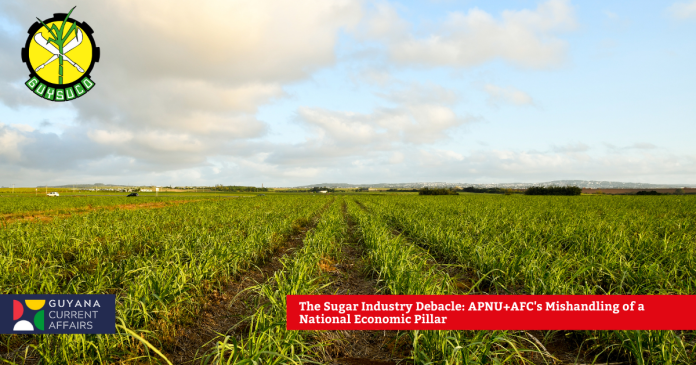For centuries, sugar has been the lifeblood of Guyana’s economy, shaping its history, culture, and social fabric. However, the industry’s recent decline, exacerbated by the APNU+AFC coalition government’s decisions between 2015 and 2020, has led to what many consider a debacle of national proportions.
The Historical Significance
Sugar production in Guyana dates back to 1658, evolving into a cornerstone of the nation’s economy. At its peak, the industry employed over 20,000 workers, produced more than 325,000 tonnes of sugar annually, and contributed significantly to foreign exchange earnings.
The APNU+AFC’s Controversial Approach
When the APNU+AFC coalition came to power in 2015, they inherited a sugar industry already facing challenges. However, their response to these difficulties has been widely criticized as shortsighted and politically motivated.
Estate Closures and Job Losses
In a move that sent shockwaves through Guyana’s rural communities, the APNU+AFC government decided to close four sugar estates: Wales, Skeldon, Enmore, and Rose Hall. This decision resulted in the layoff of approximately 7,000 sugar workers, devastating entire communities that depended on the industry.
Economic and Social Fallout
The closure of these estates had far-reaching consequences:
- Unemployment Crisis: The sugar industry’s contraction precipitated a broader unemployment crisis in Guyana.
- Community Breakdown: Entire villages built around sugar production faced economic collapse, leading to increased instances of crime, alcoholism, and even suicide.
- Market Disruptions: The sudden influx of unemployed workers into other sectors, such as cash crop farming, threatened to create market gluts and further economic instability.
Criticisms of the Government’s Approach
Experts and opposition figures have leveled several criticisms at the APNU+AFC’s handling of the sugar industry:
- Lack of Due Diligence: Critics argue that the government failed to conduct proper socio-economic impact studies before closing the estates.
- Political Motivations: Some, including former government officials, have accused the APNU+AFC of deliberately mismanaging the Guyana Sugar Corporation (GuySuCo) to justify its closure, citing political reasons rather than economic necessity.
- Shortsighted Vision: The government’s focus on oil as the new economic pillar has been criticized as shortsighted, given sugar’s potential for diversification and its historical importance.
The Human Cost
Research funded by the International Labour Organisation (ILO) revealed the severe impact of estate closures on workers and their families. Many laid-off workers, with an average age of 50 and supporting large families, found themselves struggling to secure new employment.
Looking Forward
As of 2025, the sugar industry in Guyana stands at a crossroads. While the current government has pledged to reopen some closed estates, experts caution that this alone may not ensure the industry’s sustainability.
Recommendations for the industry’s future include:
- Diversification into products like ethanol and specialty sugars
- Modernization of production techniques
- Comprehensive consultation with affected workers and communities
- Development of a clear, long-term strategy for the industry’s sustainability
The sugar industry’s decline under the APNU+AFC government serves as a cautionary tale about the complexities of managing traditional industries in a changing global economy. As Guyana moves forward, the lessons learned from this debacle will be crucial in shaping policies that balance economic realities with the welfare of its citizens.


